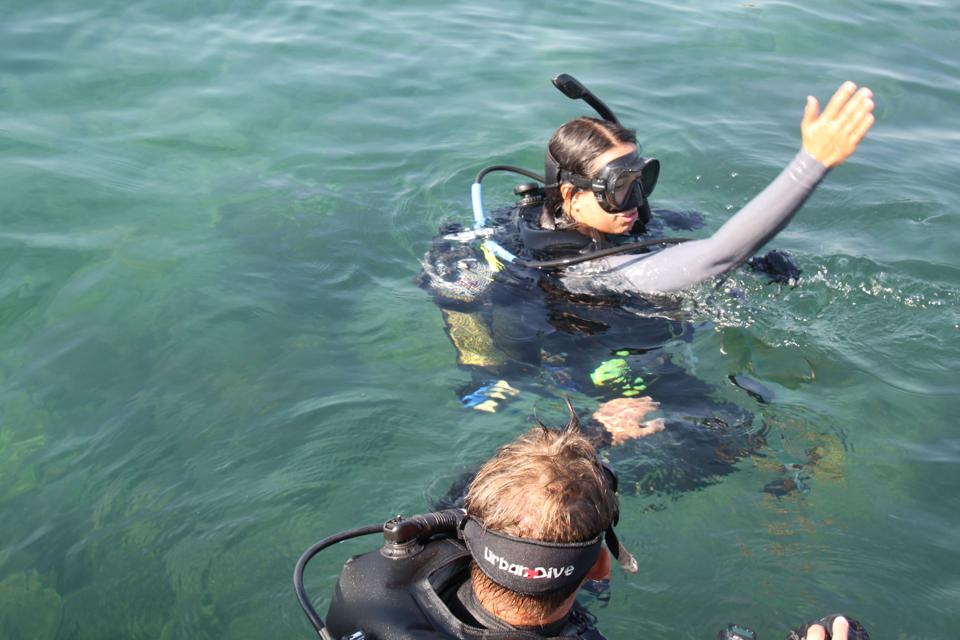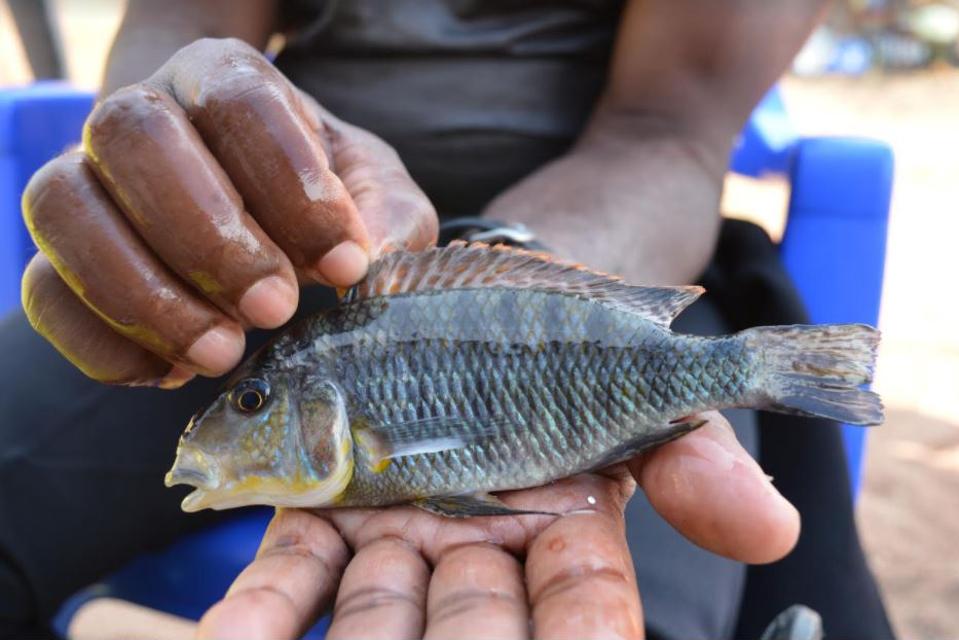
Jimena Golcher-Benavides and Chris Horsfall, a sponsor from Tanganyika's Lake Shore lodge, ... [+]
Jimena Golcher-BenavidesCosta Rican scientist Jimena Golcher-Benavides goes scuba-diving in the the world’s deepest tropical freshwater lake to study Cichlidae, simply known as cichlids, an important fish species for small-scale fisheries, aquaculture and in the global aquarium trade.
Golcher-Benavides, who is now a PhD candidate in Ecology at the University of Wyoming in the US says that her research, focused in Lake Tanganyika, seeks to answer lingering questions in evolutionary ecology such as how biodiversity originated and what the study of Lake Tanganyikan cichlids' evolutionary history tell us about how the group became so diverse globally.
"Surveying fishes while scuba-diving in Lake Tanganyika has allowed me to gain understanding on complex species interactions, the role resource-rich environments play in supporting greater diversity," she says, "Unfortunately, suitable habitat for fish and other aquatic fauna in the water column is shrinking due to climate warming, threatening unique species and the human livelihoods that depend on them."
"My favorite thing about cichlids is their unusual behaviors!" she said, adding that some feign death, while others take risks to protect kin or team-up with other species for attracting a mate.
"Some species even many do mouth-brooding, where one or both parents incubate offspring in their mouths!" she said.
Golcher-Benavides says her work contributes to ongoing efforts to monitor human/climate-driven declines in freshwater fish populations and this translates into serious consequences on food security and human health for already vulnerable local communities.
This research is being led by Dr. Ismael Kimirei, Director General at the Tanzanian Fisheries Resarch Institute (AFIRI) and with support from The Nature Conservancy's fisheries conservation team in Lake Tanganyika.
Golcher-Benavides grew up in the city of Heredia, Costa Rica, where she became both interested in environmental issues concerning freshwater and fascinated with aquatic biodiversity.
"I dreamed of discovery, she said, "I wanted to challenge myself by pursuing a scientific career in fish evolutionary biology integrating apparently disjunct disciplines of natural history, ecology and genomics"
Later on, she was given an opportunity to develop her own independent research project as an undergraduate research assistant in fish biology at Universidad Nacional de Costa Rica (UNA) and a graduate experience in Germany
"I worked hard (and still do) to earn a spot in male (andeconomically advantaged) biased fields," she said, "I sometimes still feel "out of place" in academia, but the support from peers, mentors as well as earning scholarships has helped me to become a lot more confident and able to keep up with the hard work."
Golcher-Benavides is also very aware of the particular challenges for international students in the US system.
"A few months ago, I learned that my migratory status was threatened by the US visa crack-down which brought a big deal of uncertainty and contributed to a surge in feelings related to systemic immigrant marginalization in our societies," she said, adding that fortunately she wasn't directly impacted and it spurred her on to further action to support marginalized groups.
In recent months Golcher-Benavides has actively participated in student-led discussions on diversity and inclusiveness, supported and co-organized international students and given online zoom scientific/outreach talks to middle school,high school and college students.

Fisherman and cichlid expert George Kazumbe holding a male cichlid Gnathochromis pfefferi at Cape ... [+]
Jimena Golcher-BenavidesGolcher-Benavides says countries in the Global South have little resources devoted to environmental monitoring of habitat degradation and climate change, which is necessary to optimize biodiversity conservation efforts. Moreover, greater involvement from all areas of society is required to slow down rampant biodiversity loss.
"Luckily, we are witnessing an unprecedented amount of technology development and information sharing, in the shape of open access literature and computational tools needed to accomplish complex tasks, therefore a key investment needs to be in terms of human capacity building for the effective implementation of biodiversity conservation measures" she said.
Golcher-Benavides says that along with her UW PhD advisor Dr. Catherine Wagner and PhD candidate Jessi Rick , she organized and taught NSF funded workshops directed to fisheries researchers in Tanzania on R programming language, an open access tool for data analyses and visualization.
"Building capacity in open-access and versatile computational tools can enhance information sharing on key management topics -such as fish captures- as well as support research and live collaboration among various stakeholders" she said.
Golcher-Benavides is part of a growing wave of Costa Rican scientists contributing to research that benefits the Global South. One such researcher is Katherine Gonzalez.
Her work at the Bernal Lab at Purdue University in Indiana aims to explore how a tiny fly in the middle of the jungle can hear the love songs that male frogs produce for females. The flies then find the frogs and feed on their blood.
Another young Costa Rican is Enrique Lin Shiao arrived last year in the Doudna Lab, famous for being world-leaders in CRISPR/Cas-9 technology, but he has also been working out how to use automation to do Coronavirus testing on a massive scale.
The Link LonkOctober 07, 2020 at 09:00PM
https://ift.tt/36GyBgE
This Costa Rican Scientist Investigates African Lake Fish Mysteries - Forbes
https://ift.tt/35JkYuc
Fish
No comments:
Post a Comment